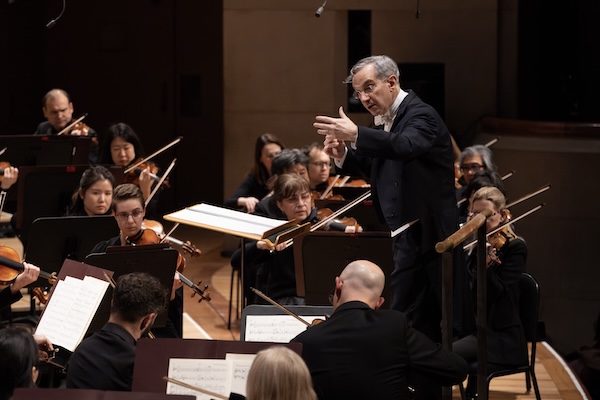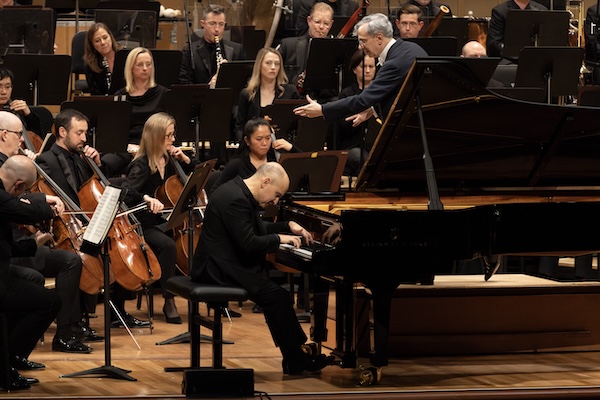Pairs of premieres and showpieces provide enjoyable contrast with the Dallas Symphony

The Dallas Symphony Orchestra featured a world premiere by composer-in-residence, Sophia Jani and a Dallas premiere by Arlene Sierra Thursday night. The program was anchored by Sergei Rachmaninoff’s formidable Piano Concerto No. 3 with Nelson Goerner as soloist and closing with Till Eulenspiegel’s Merry Pranks by Richard Strauss.
I Wish You Daisies and Roses kicked off the evening’s program, appearing slightly over a year after the Dallas premiere of Jani’s Flare. Her first composition after the birth of her son, Jani described I Wish You Daisies as capturing “the complex emotional world that comes with the first months of motherhood.”
Following the boisterous fanfares that open the piece, Luisi calmly guided the orchestra through a succession of coloristic waves, each marked by contrasting dynamics, rhythmic figures and melodic ostinatos, and all linked by a continuous pedal point. One of the earlier waves featured a rhythmic motto sounded by timpani that resembled a heartbeat; a later wave consisted of a distinctly rocking pattern sounded by strings.
I Wish You Daisies and Roses was richly sonorous and generally consonant throughout, making full use of the DSO’s vibrant orchestral palette. The harmonies embellishing the continuous pedal point were marked by modal shifts that occasionally crossed into minor mode, perhaps indicating the hint of trepidation that might accompany the hope, joy and elation experienced when envisioning the future of a newly arrived child.
Nelson Goerner was the featured soloist in Rachmaninoff’s Third Piano Concerto, a piece renowned for its difficulty. Goerner took command of the concerto from the beginning, his introductory lines easily holding their own within the orchestral opening.

As the first movement continued, however, Goerner’s loud playing frequently overpowered the orchestra, even in more delicate and lyrical interludes. The piano was undoubtedly the principal source of excitement and energy during the piece, but many of the rapid scales and similar virtuosic passages were a blur, obscuring some of the contrapuntal complexity of the piano part. Despite Luisi’s precise direction, the orchestra often seemed overwhelmed by Goerner’s playing much as Luisi’s presence on the podium was somewhat obscured by the open lid of the instrument.
The situation improved slightly during the second movement, notably during passages in which the piano was echoed by solo winds or horns. Going into the third movement, balance continued to be an issue, and the piano’s rapid scalar and melodic lines tended to blur more than sparkle.
None of this seemed to bother the audience, members of whom leaped to their feet with applause immediately following the last chord. The audience’s enthusiasm prompted Goerner to return for an elegant encore of Chopin’s Nocturne No. 20 in C Sharp Minor rendered with a clarity missing in the earlier concerto.
The second half of the program consisted of distinctly illustrative pieces, beginning with Arlene Sierra’s Kiskadee, a work co-commissioned by the DSO and premiered by the Utah Symphony in 2022.
Kiskadee is the latest of several works by Sierra that incorporate transcriptions of bird song; in this case, the call of the titular bird provides a four-note motif that is one of many irregular, coloristic gestures derived from natural sounds in the kiskadee’s habitat. Following a raucous opening that introduced the kiskadee’s call, the piece unfolded as a complex soundscape consisting of shimmering strings and reiterated pitches in the winds and brass, all coordinated by the steady beat indicated by Luisi as he also cued distinct bird calls within the collage. The result was an effective and engaging suggestion of a teeming outdoor space.
Richard Strauss’s tone poem, Till Eulenspiegel’s Merry Pranks, which capped the evening’s program, depicts the antics of the medieval Germanic folk hero in a series of musical episodes united by two themes sounded respectively by horns and clarinets that evoke the character’s good natured optimism and his brash irreverence.
Luisi’s direction on the podium almost seemed to echo the amusing, comical escapades of the protagonist, coaxing appropriate moods from the DSO as it accompanied Till’s disruption of the marketplace, his mocking of authority figures and his impertinence even in the face of execution for his antics. Together, conductor and ensemble perfectly captured the jocular nature of Strauss’s piece from the charming , “once-upon-a-time” nostalgia of its opening and closing gestures to the various misadventures of Till himself, infusing all of these with the character’s good humor and sardonic wit in a rollicking performance.
The program will be repeated 7:30 p.m. Friday and Saturday and 3 p.m. Sunday. dallassymphony.org

